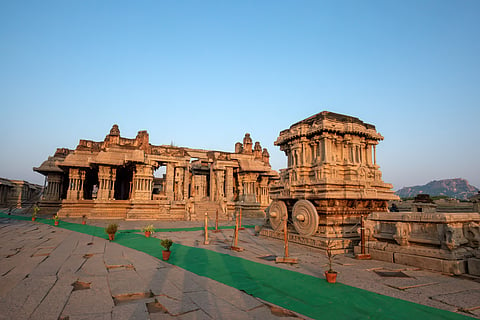
- Destinations
- Experiences
- Stay
- What's new
- Celebrating People
- Responsible Tourism
- CampaignsCampaigns
- SubscribeSubscribe
- Buy Now

The UNESCO World Heritage Site of Hampi, once the capital of the Vijayanagara Empire from 1336 to 1565, will soon get quick-response (QR) codes on 10 pillars at the Vijaya Vitthala Temple for tourists to scan and listen to 25-second music clips.
The initiative by the Archaeological Survey of India (ASI) is aimed at avoiding a possible rush in front of the monument. Currently, two QR codes have been installed on each pillar, but within a few days, the number of QR codes will be increased to accommodate more people at the bottom of all 56 pillars. There is ongoing discussion about including a video recording in the future, too.
Before 2008, tourists could tap 56 stone pillars at the Vijaya Vitthala Temple in Hampi and enjoy the music they produced. Due to concerns over the weakening of the pillars, the ASI restricted access to them. Hampi received nearly 16,000 foreign visitors in 2023 alone, but its limited infrastructure development has been a cause for concern. Thus, initiatives like the QR-coded musical pillars are part of many new amenities to enrich the Hampi tourism experience.
It has also been reported that the Department of Tourism plans to build 20 “traveller nooks” to enhance accessibility and convenience at the site and address the shortage of basic amenities. These nooks, designed with Hampi's archaeological, cultural and natural landscape in mind, will reportedly offer facilities like drinking water, mother and child care centres, clean toilets, and information kiosks, all to improve the visitor experience.
The report added that the initiative, part of the union government’s Swadesh Darshan 2.0 scheme, is expected to increase annual tourist visits from 1.28 million to 2.06 million over the next five years.
The proposed traveller nooks are outlined in a “Detailed Project Report,” which categorises them into three sizes: Noble (small), Royal (medium) and Imperial (large). The report specifies eight Noble, seven Royal and five Imperial nooks, featuring amenities such as breastfeeding and diaper-changing stations, WiFi seating areas, and disabled-friendly washrooms.
(With inputs from news agencies)
